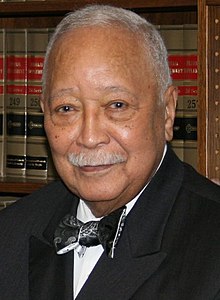David Dinkins
David Norman Dinkins (July 10, 1927 – November 23, 2020) was an American politician, lawyer, and author who served as the 106th mayor of New York City from 1990 to 1993.A longtime member of Harlem's Carver Democratic Club, Dinkins began his electoral career by serving in the New York State Assembly in 1966, eventually advancing to Manhattan borough president.After traveling the Northeastern United States, he finally found a recruiting station that had not, in his words, "filled their quota for Negro Marines"; however, World War II was over before Dinkins finished boot camp.[7][8][9] Dinkins was among the Montford Point Marines who received the Congressional Gold Medal from the United States Senate and House of Representatives.[3][11] He became part of an influential group of African American politicians that included Denny Farrell, Percy Sutton, Basil Paterson, and Charles Rangel; the latter three together with Dinkins were known as the "Gang of Four".[18] Dinkins was elected in the wake of a corruption scandal that stemmed from the decline of longtime Brooklyn Democratic Party chairman and preeminent New York City political leader Meade Esposito's American Mafia-influenced patronage network, ultimately precipitating the suicide of Queens Borough President Donald Manes and a series of criminal convictions among the city's Democratic leadership.Koch, the presumptive Democratic nominee, was politically damaged by his administration's ties to the Esposito network and his handling of racial issues, exemplified by his fealty to affluent interests in predominantly white areas of Manhattan.[19] Additionally, the fact that Dinkins was African American helped him to avoid criticism that he was ignoring the Black vote by campaigning to whites.[21] Dinkins entered office in January 1990 pledging racial healing, and famously referred to New York City's demographic diversity as "not a melting pot, but a gorgeous mosaic".[24][25] However, the high absolute levels, the peak early in his administration, and the only modest decline subsequently (homicide down 12% from 1990 to 1993)[26] resulted in Dinkins' suffering politically from the perception that crime remained out of control on his watch.[37][38] During his final days in office, Dinkins made last-minute negotiations with the sanitation workers, presumably to preserve the public status of garbage removal.When Lemrick Nelson was acquitted of murdering Yankel Rosenbaum during the Crown Heights riots, Dinkins said, "I have no doubt that in this case the criminal-justice system has operated fairly and openly.[45] New York City's crime rate, including the murder rate, declined in Dinkins' final years in office; Dinkins persuaded the state legislature to dedicate certain tax revenue for crime control (including an increase in the size of the New York Police Department along with after-school programs for teenagers), and he hired Raymond W. Kelly as police commissioner.[71] Dinkins starred as himself on April 13, 2018, in "Risk Management", the 19th episode of the 8th season of the CBS police procedural drama Blue Bloods.[72] On November 23, 2020, Dinkins died from unspecified natural causes at his home on the Upper East Side of Manhattan, about a month after his wife's death.


Mayor of New York CityEd KochRudy GiulianiBorough PresidentManhattanAndrew SteinRuth MessingerNew York State AssemblyEdward A. Stevenson Sr.Trenton, New JerseyDemocraticDemocratic Socialists of AmericaJoyce BurrowsHoward UniversityBrooklyn Law SchoolUnited StatesUnited States Marine CorpsMontford Point MarinesU.S. Marinescum laudeHarlem1989 New York City mayoral electionAfrican Americanin 1993Columbia UniversityTrenton Central High Schoolracial quotaWorld War IIboot campprivate first classCongressional Gold Medalbachelor's degreeJ. Raymond JonesDenny FarrellPercy SuttonBasil PatersonCharles RangelGang of FourInner City Broadcasting CorporationNew York City Board of Electionsdeputy mayorAbraham D. BeameRobert D. McFaddenOn November 7, 1989Menachem Mendel SchneersonLubavitcherMeade EspositoAmerican MafiaDonald ManesNew York City Board of EstimateFourteenth AmendmentEqual Protection ClauseSupreme Court of the United StatesNew York City Charter Revision CommissionNew York City CouncilWilliam Lynch Jr.Mario CuomoDick CheneyColin PowellNorman SchwarzkopfhomicideThe New York TimesPatrolmen's Benevolent Association (PBA)Civilian Complaint Review BoardWashington Heights RiotDominican RepublicGracie Mansionprotest on September 16, 1992Brooklyn BridgeCity Halllicensing of locksmithsVictor GotbaumUSTA National Tennis CenterUS OpenNew York YankeesNew York MetsNew York KnicksNew York RangersFashion WeekRestaurant WeekBroadway on BroadwayFamily Red Apple boycottFlatbush1991 Crown Heights riotLemrick NelsonYankel RosenbaumCrown Heights riotsScud missilesgas masksNew York Police DepartmentRaymond W. KellyTimes SquareThe Walt Disney CompanyNew Amsterdam Theatre42nd Street99-year leaseUnited States Tennis AssociationMichael BloombergSouth Bronxsupportive housing1993 New York City mayoral electionRepublican1989 electionStaten IslandNew York State LegislatureSchool of International and Public AffairsChildren's Health FundNelson Mandela Children's FundIndependent News & MediaCouncil on Foreign RelationsPeter KnoblerMark Green2001 mayoral raceFernando FerrerBill ThompsonBill de Blasio2004 Democratic presidential primariesWesley ClarkHillary ClintonJazz Foundation of AmericaHurricane KatrinaChildren's Health Fund (CHF)Nelson Mandela Children's Fund (NMCF)Posse FoundationDavid N. Dinkins Municipal BuildingUS Open tennis